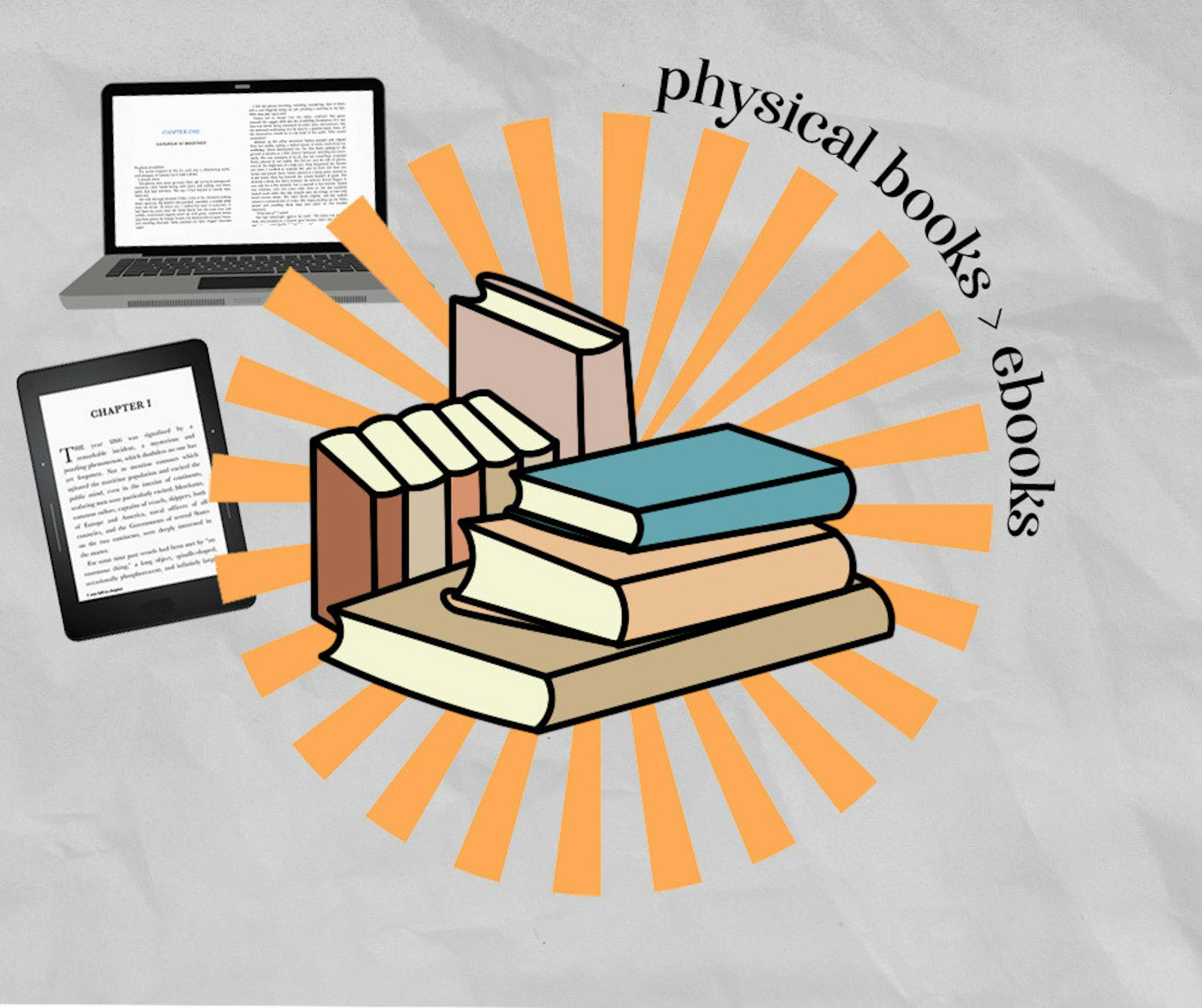
I am vehemently anti-eBook. I don’t like the weight of a Kindle, the screen fatigue of my laptop or the cool, electronic feeling against my thumb as I go to flip a virtual page. I hate how online novels have no smell, texture or history. eBooks are secretive and private. You can’t see past the sleek black screen of a Kindle to identify the book by its cover. You can’t pass an eBook down through generations, leaving annotations for the next reader. For me, reading is an antidote for the internet — so why would I read online? We should move away from the internet side of literature and focus on hard copy books because they tell stories, create community and eliminate the pull of the internet.
I’d forfeit the convenience and portability of an eBook any day for the feeling of a worn, pre-loved book: one whose spine is coming undone and whose pages are stained with ink and coffee. The notion that someone broke in this book before me feels special, like there’s a secret between all the previous readers and me, the only ones who have touched, dog-eared, annotated and loved this specific copy. A used book might have travelled all over the world. It could have witnessed weddings, reunions, disasters and celebrations. Old books existed in a time before screens, when people toted around heavy books and read for pleasure. Vintage books transport you back in time; the same cannot be said for eBooks.
Similarly, brand new books smell like fresh ink and oaky paper; their covers are crisp and untarnished — a pleasant break from an unscented, sterile Kindle. I like buying recently released books and finding the author’s signature inside, reminding me that I am about to join an exclusive club of people who have read that book. For a short time, it is my secret. Reading is solitary, but holding a printed book connects you to other readers: from those who see you reading their favorite book to those you will never meet but owned your copy before you. eBooks, however, forfeit this community for convenience.
They also turn a private activity into a very performative one. Posting a book on your social media is a way to declare to the world that you are educated and well-read. Instagram accounts devoted to book recommendations have been gaining popularity since the 2010 release of the app. My social media feed isinundated with photos of books accompanied by captions like “here’s everything I read this summer.” Trendy books with aesthetic covers — “Normal People” by Sally Rooney, “A Little Life”by Hanya Yanagihara, “Such a Fun Age”by Kiley Reid and “Bad Feminist”by Roxanne Gay — are all over social media. A literary corner of Tik Tok, aptly dubbed “BookTok,” has also become omnipresent. It features recommendations for books that’ll make you fall in love with reading and books that’ll change your perspective on life. While good-intentioned, posting about reading as an escape from the internet is incredibly ironic. If you feel compelled to post about your reading habits on Instagram, you certainly haven’t evaded the internet’s grasp.
How did such an individualistic activity develop an air of performance? I read to learn something, to better myself and to escape the world. So why am I so preoccupied with impressing people with my choices of literature? Through Goodreads, Instagram and Tik Tok, we’ve become obsessed with documenting every single book we read — but who are we doing it for?
Living with the internet means constantly proving yourself to the world. We post to prove that we dress well, have friends, go to a good college and have unique interests and hobbies. We are the generation that documents everything we cook, eat, wear and visit. Even reading, which is quite possibly the most solitary activity I engage in, is subject to that treatment. Although it’s easier said than done, reading should ultimately be separate from the performance of the other aspects of our lives.
I want to look at reading the way I did when I was younger, before I was sucked into the endless void of social media and before I learned that reading equals smart. I miss the days when I’d wake up early to read in my living room by the big window where the light streamed in and illuminated the pages. Reading should be kept old fashioned. That means reverting back to paperback books, reading for pleasure and ending the pressure to document your reads. It means separation from the internet in every way — from eBooks, from Instagram, from Goodreads. Only then will the age of performative reading end.
Sophia Peyser (25C) is from Manhattan, New York.

Sophia Peyser (she/her) (25C) is from New York City, majoring in creative writing and environmental science. Outside of the Wheel, Peyser has worked as a content writer and freelance journalist. You can find her reading Sally Rooney novels or working shifts at a Brooklyn bakery.





